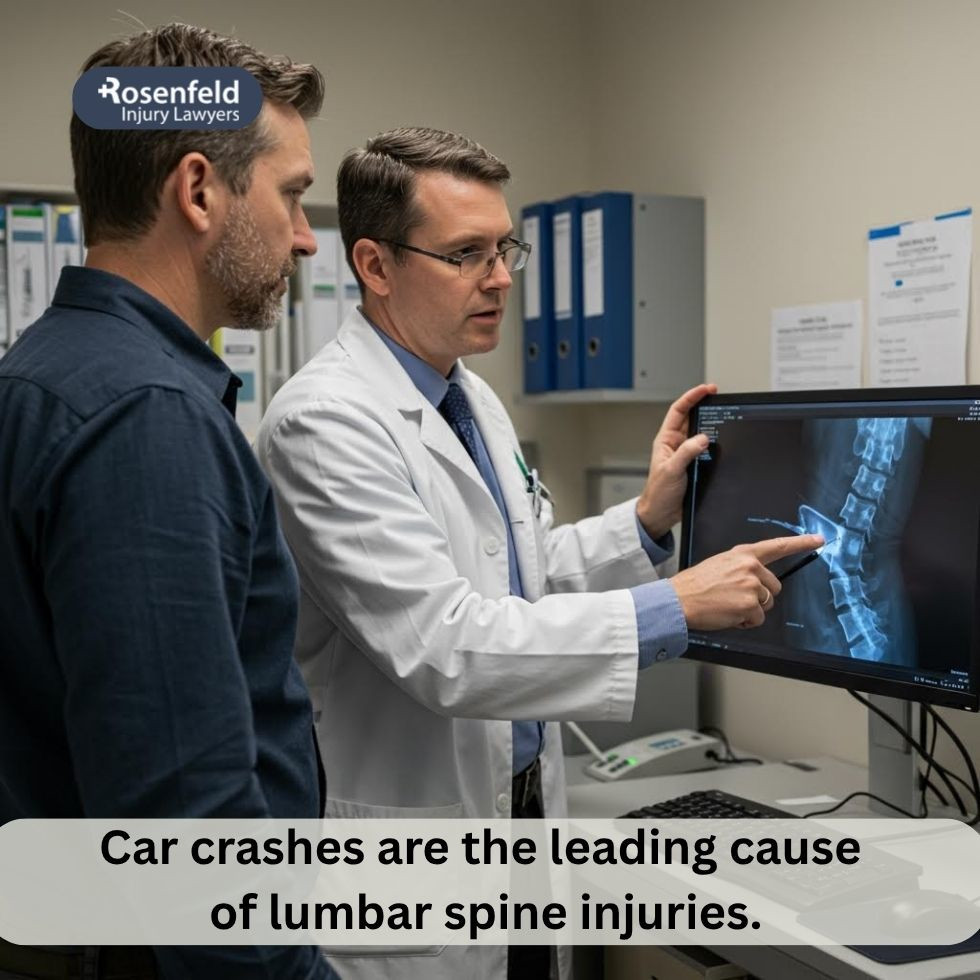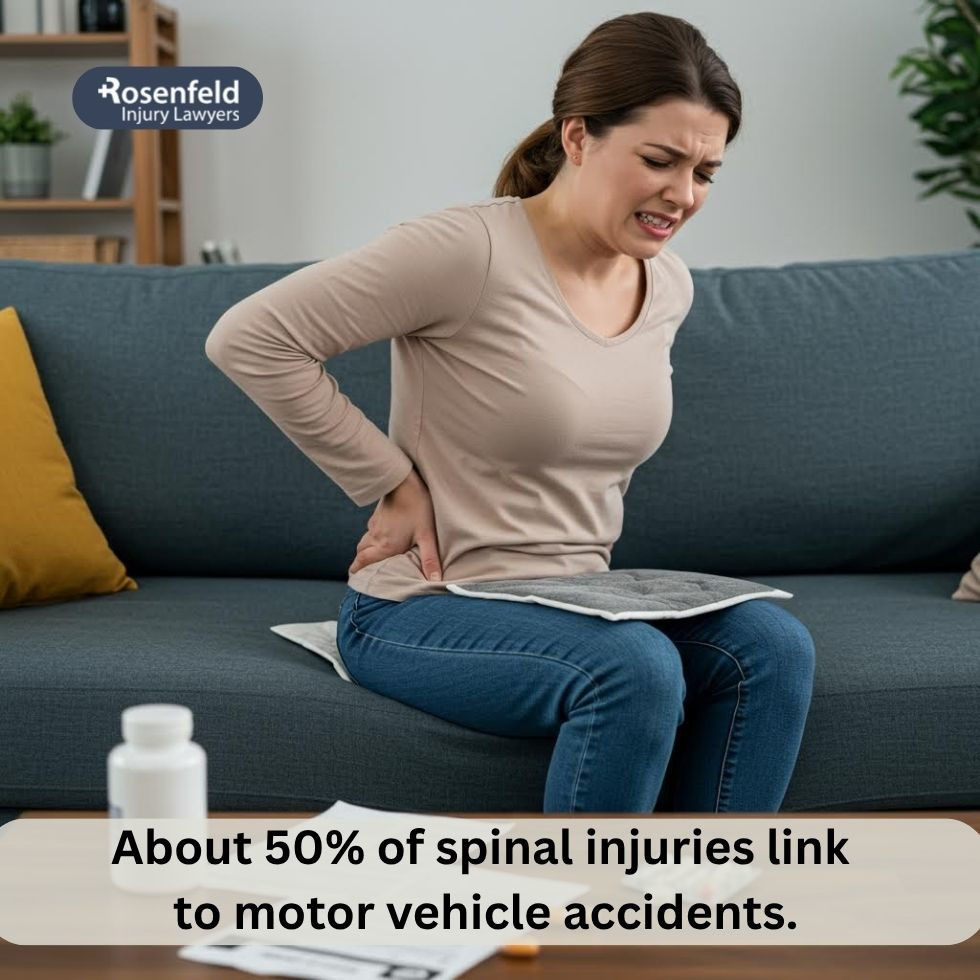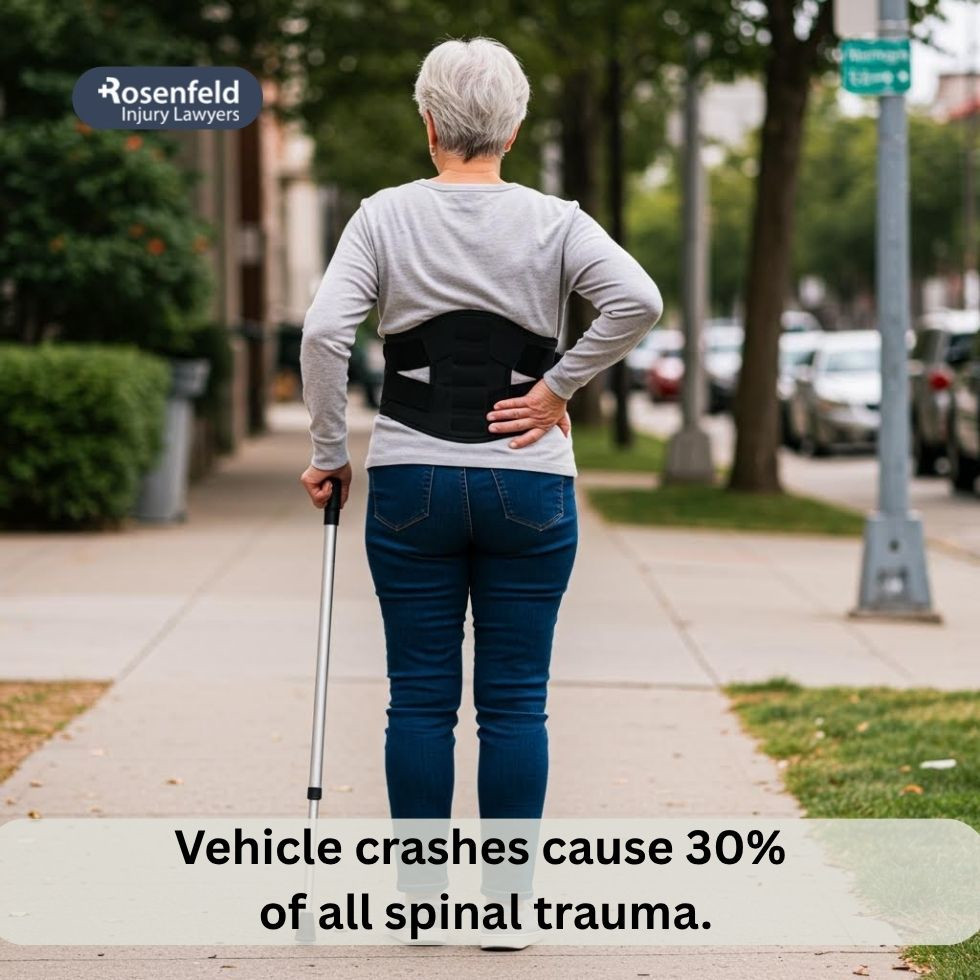- 24/7 Free Consultation: (888) 424-5757 Tap Here To Call Us
What Are the Most Common Car Accident Back Injuries?
Car accidents are a leading cause of back injuries, with 65% of car accident injuries causing lower back pain alone. If you’re wondering: “What are the most common car accident back injuries?”, know that victims often suffer from whiplash, herniated discs, spinal fractures, and muscle or ligament strains—some of which may not show symptoms until hours or days later.
With the city’s high-traffic areas, such as Ashland Avenue & 95th Street, Western Avenue & Belmont Avenue, I-90, and Interstate 290 (the IKE), back injuries are often sustained during collisions.
Car Accident Back Injuries Are More Common Than You Think
According to the Illinois Department of Transportation (IDOT), there were over 101,000 car accidents in Chicago in 2023, with many of those crashes resulting in spinal injuries and back pain.
A minor injury or something more severe, like a fracture or severe back injuries from car accidents, can cause significant back pain, impact mobility, and require extensive medical treatment.
Here’s a closer look at the most common back injuries caused by car accidents.

Spinal Cord Injuries and Their Life-Altering Consequences
One of the most serious consequences of a car accident is a spinal cord injury. When the spinal cord is damaged, it can lead to partial or complete paralysis, which significantly impacts the victim’s quality of life.
Depending on where the injury occurs along the spinal column, victims may experience paraplegia or quadriplegia. The cervical vertebrae (upper spine) are particularly vulnerable in high-speed crashes, and injuries to this area typically result in loss of movement and sensation below the site of injury.
Immediate medical attention is critical, and long-term care is often necessary to avoid permanent disability.
Herniated Discs: A Common Cause of Severe Back Pain
A herniated disc occurs when the cushioning between the vertebrae shifts and presses on spinal nerves. In a car accident caused by a sudden impact, the force can push the spine out of alignment, leading to a slipped or ruptured disc. Victims may experience burning pain, numbness, or difficulty moving.
Immediate symptoms often include shoulder pain or discomfort radiating through the limbs. If left untreated, this type of serious back injury can develop into degenerative disc disease.
Recovery typically involves physical therapy, though surgery may be necessary in more severe cases.
Vertebrae Fractures and Their Impact on Mobility
Vertebrae fractures are another injury frequently seen in car accidents, and they can severely affect the spinal column. Since the vertebrae protect the spinal cord, a fracture can lead to instability, permanent nerve damage, or even paralysis.
Compression and burst fractures are especially dangerous in high-speed collisions, such as those on I-90 or I-94. Victims often present with persistent headaches, back pain, and reduced mobility. These severe back injuries may require surgical repair to maintain stability and prevent further neurological issues.
Torn Back Muscles: A Common Soft Tissue Injury
Aside from bone-related back injuries, many people experience soft tissue trauma, like torn muscles, during a car accident. Torn back muscles often lead to mild back pain, tightness, and difficulty turning or bending. Some individuals also report experiencing muscle spasms, which can intensify discomfort.
Treatment includes rest, back pain relief methods, and guided rehabilitation therapy to restore function. While these may not seem as severe initially, untreated soft tissue injuries can contribute to long-term dysfunction.

Torn Ligaments and Long-Term Stability Issues
With over 200 ligaments in the human body supporting the back, tearing even one during a crash can result in a serious back injury. These ligament injuries compromise structural support and often take a long time to heal.
Common following symptoms include limited motion, aching, and instability. In some cases, patients need surgical stabilization. If you’re dealing with lingering back pain after a crash, seek medical evaluation to avoid worse conditions.
Lumbar Spinal Injuries: Damage to the Lower Back
The lumbar spine, or lower back, is particularly vulnerable in accidents due to its weight-bearing role. Lumbar injuries range in severity from strained muscles to fractured vertebrae. Some present symptoms include lower back discomfort or difficulty standing.
More severe cases may cause incontinence or loss of movement. Emergency treatment early can make a major difference in your recovery and help avoid complications.
Sciatica: Nerve Pain After a Car Crash
If a past car accident caused trauma that can aggravate or damage the sciatic nerve, you can develop sciatica. This causes radiating leg pain, numbness, and muscle weakness. It can also be a sign of an underlying serious back injury, like a herniated disc.
Treatment options typically include therapeutic exercises, anti-inflammatory medications, and targeted pain relief strategies. In persistent cases, surgical intervention may be required to ease the pressure on the nerve.
Thoracic Spine Injuries and Their Lasting Effects
The thoracic spine—or mid-back—may not move as much as the lumbar area, but injuries in this region can still be quite damaging. A car accident impact can lead to rib fractures, soft tissue damage, and internal organ complications. Victims might need emergency treatment if the trauma interferes with breathing or causes severe pain.
Thoracic spine injuries can cause chronic pain and make everyday activities more difficult. Consulting a personal injury specialist can help assess the full extent of the trauma and determine your next steps.
Spinal Stenosis
Spinal stenosis occurs when the spinal canal narrows, placing pressure on the spinal cord and surrounding nerves. A spine injury from a collision, especially one involving a spinal fracture or herniated disc, can trigger or worsen this condition. Injuries from auto accidents can cause swelling or structural damage that compresses the spinal canal, leading to ongoing discomfort.
Common symptoms of spinal compression after a crash include lower back pain, leg weakness, numbness, and difficulty standing for long periods. In some cases, chronic pain may develop if the compression is not treated.
Treatment usually begins with physical therapy or medication for pain management. However, severe cases may require surgery to decompress the spinal cord and restore mobility. These procedures, along with follow-up care, can contribute to significant medical expenses, especially when long-term rehabilitation is needed.
Facet Joint Injuries and Limited Range of Motion
Facet joints are small joints in the spine that help stabilize the vertebrae and allow smooth movement. A car accident victim can experience inflammation, dislocation, or even a compression fracture of these joints, leading to stiffness and chronic back pain.
These types of injury symptoms typically reduce the ability to bend or twist comfortably and may require mobility training or long-term back pain management.
Spondylolisthesis: When a Vertebra Slips Forward
Spondylolisthesis occurs when a vertebra slips out of place and presses on surrounding nerves, leading to neck pain, tingling, or numbness. This can happen during a serious collision, especially when the thoracic or cervical spine absorbs the brunt of the impact.
In these cases, a car accident victim may need spinal fusion surgery to restore stability and prevent additional nerve damage.

When a Spine Injury Requires Surgery
Some severe injuries to the spine, like a compression fracture, herniated disc, or nerve impingement, can’t be resolved with conservative care. When injury symptoms don’t improve with rest or restorative therapy, surgery becomes necessary.
Procedures like spinal fusion, nerve decompression, or disc replacement are often performed to treat serious trauma, especially in the upper back or cervical spine. In Chicago, hospitals such as Rush University Medical Center and Northwestern Medicine provide advanced surgical care tailored to car crash-related spinal injuries.
Diagnosing Spinal Injuries Caused By A Car Accident
Accurate diagnosis of back injuries is critical to treat spinal injuries after a car crash properly. MRI, CT scans, and X-rays are essential tools for detecting fractures, herniated discs, and soft tissue damage. Early detection of spinal fractures or nerve damage can help prevent long-term disability and chronic pain.
Healthcare costs for back injuries from car crashes can be expensive, which is why contacting a lawyer who specializes in back injuries is essential.
Why You Should Contact a Chicago Personal Injury Attorney

In Illinois, the fault-based insurance system means the at-fault driver’s insurance is responsible for covering the cost of injuries, including back and spinal injuries. A Chicago car accident lawyer can help you maximize compensation for medical bills, lost wages, and ongoing care.
If you’ve suffered back injuries from car accidents, a personal injury attorney in Chicago can also make certain your medical costs and pain and suffering are properly valued when negotiating with insurance companies.
Contact us at (888) 424-5757 or fill out our form to discuss your injury claim options.
All content undergoes thorough legal review by experienced attorneys, including Jonathan Rosenfeld. With 25 years of experience in personal injury law and over 100 years of combined legal expertise within our team, we ensure that every article is legally accurate, compliant, and reflects current legal standards.







